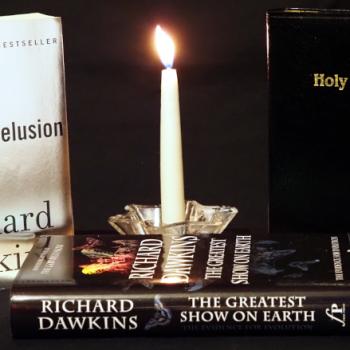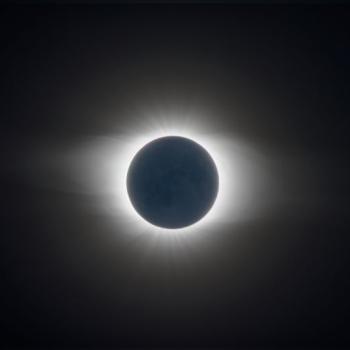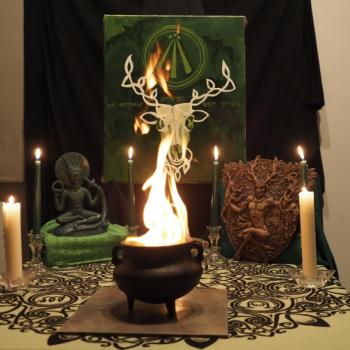Recently there’s been some fighting between hard polytheists and humanistic Pagans on the nature of the gods. While I have no desire to participate in an unnecessary fight, I do feel the need to state my position as clearly as I can. The timing is good for such a statement, since some friends who don’t know much about Paganism have been drawn here by the post on my ordination.
My position on the nature of the gods can be summarized like this:
I am a hard polytheist practicing within a framework of pantheism and mysticism.
Now let me elaborate.
Hard polytheist. As a hard polytheist, I believe there are many gods and goddesses who are real, distinct, individual beings. I don’t believe they’re metaphors or archetypes. I don’t believe they’re all aspects of one great God/dess, although I will occasionally use the language of soft polytheism if it helps me relate to someone who takes monotheism for granted.
I believe this because my experience of Isis is very different from my experience of Danu, my experience of Morrigan is different from my experience of Cernunnos, and my experience of Osiris is different from my experience of Brighid. When I read the stories of my ancestors, it’s clear they thought the gods were individual beings too. Monotheism is a nice idea, but you need only look at the number of people who cry “where is God?” to understand that the world we live in is better explained by many gods and goddesses of limited power than by one all powerful God.
Practicing. For most of the world for most of history, religion has not been about what you believe but about who you are and what you do. The concept that religion is primarily about what you believe is a modern, Western, Protestant idea. When I said that to John Michael Greer last week, he said “I’d add a four adjective – dysfunctional.”
My religion is something I do: I pray, meditate and study. I attend circles and celebrations. I pour offerings. I listen for the callings of my gods and goddesses, and I do the work they ask me to do. What we believe is important, but so is what we do.
Within a framework. Some people ask why you even need a religion – just do good and practice compassion. That may work for some, but I need a concept of who and what I’m working with, what I’m working toward, and why. I agree with the saying “the map is not the territory,” but I need the map to understand the territory and to better experience the territory. My beliefs about the gods help me learn my place in the universe and how I can best relate to the gods and to all other living things.
Pantheism. Whatever the goddesses and gods of our ancestors may be, they are certainly not all powerful and it is virtually certain none of them (together or alone) created the Universe. Additionally, I am one of countless people who have experienced an ineffable moment of Unity, where the boundaries between myself and the rest of the Universe faded and I experienced that All is One.
These two concepts are best explained by pantheism – the idea that God didn’t create the Universe, God IS the Universe. That means God – the Divine, the Sacred, the Holy – is in you and me and the Sun and the Moon and the trees and everything else. And we are all in God.
We are part of the Universe, therefore we are part of God, just as our organs and tissues are part of our body, and our cells are part of our tissues and organs. Reality is nested and interconnected. This is religious scholar and “freelance monotheist” Karen Armstrong’s idea of “the God beyond God.”
Mysticism. In the Hebrew Bible (Exodus 33:18-23), Moses asks to see YHWH but is only allowed to see his back. The literal interpretation I was taught as a child says YHWH is too holy for impure humans to look on directly. But the mythical interpretation shows the mystical truth – Moses couldn’t see God’s face because humans can only experience the Divine indirectly.
Over the last 500 years we in the West have become enamored with the idea that anything worth knowing must be observable, quantifiable and repeatable. We have elevated logos and dismissed mythos. We now know more than our ancestors could have imagined. But there are still plenty of things we don’t know, not because we haven’t discovered or figured them out yet but because they’re beyond the capacity of our powerful-but-still-limited human brains.
There are other ways of knowing: intuition, revelation, and the truths expressed in story and song. Parables, koans, and triads. Communion with the Divine.
Pantheism gives me a map for the territory of my practice. Mysticism helps fill in the blank spots on the map.
There’s one more thing I believe – I believe I may be wrong. I don’t think I’m wrong – if I thought I was wrong I’d believe something else. But religion deals with matters that are inherently uncertain. We do ourselves no favors when we pretend there is certainty where there is none. If we are to live with integrity we must remain open to new experiences, new knowledge and new wisdom. If any of that requires changing my beliefs and practices, so be it. I seek living Truth, not some fossilized attempt at it.
If we accept that our religion might be wrong no matter how meaningful and helpful it is, we are much less likely to be arrogant and rude when encountering someone whose beliefs and practices are different from our own. All beliefs are not equally valid – some are demonstrably more helpful than others. But my way isn’t the only way.
This is what I believe and what I do. I see the gods and goddesses as older, stronger and wiser than me, but we’re all part of the same divine Universe.
In my next post, I’ll explore the question of what the goddesses and gods want from us.

















